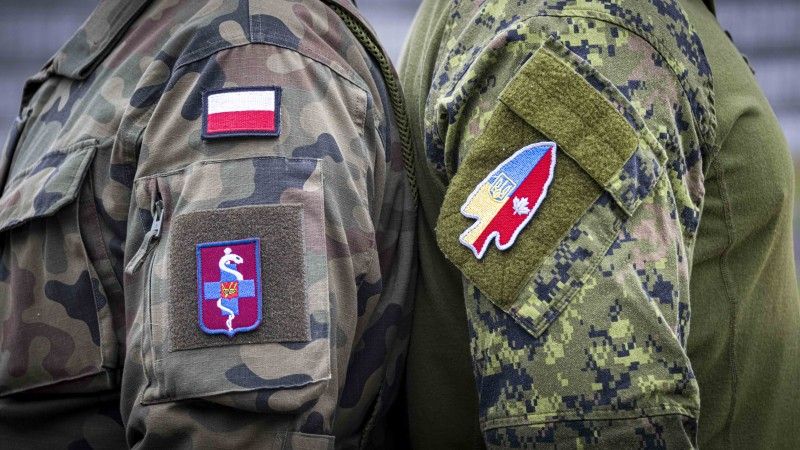Defence Policy
Over 40 Canadian Companies Coming to MSPO. Ambassador of Canada: We Are Increasing the Cooperation with Poland

Photo. Defence24
In an interview with Defence24.pl H.E. Catherine Godin, Ambassador of Canada to Poland and Colonel Stéphane Roy, Canada’s Defence Attaché to Poland, Czechia & Slovakia speak on the Polish-Canadian defence cooperation, common efforts to support Ukraine and NATO and the cooperation of defence and aerospace industries of both countries.
A sponsored article
Jakub Palowski: Madame Ambassador, please describe to us the current state of Polish-Canadian relations.
H.E. Catherine Godin, Ambassador of Canada to Poland: Canadian and Polish relations have grown appreciably stronger since the war, drawing on a shared understanding of the importance of security in this region, and the need for a strong and united international coalition willing to make tough decisions to support Ukraine in the face of Russia's full-scale invasion. Much of our assistance to help Ukrainians has relied on the cooperation of Poland and the Polish people. So on behalf of Canada, thank you.

Photo. Global Affairs Canada
We have also been so pleased to welcome many high-level visits to Canada, including Prime Minister Morawiecki and Minister of Economic Development and Technology Waldemar Buda who were in Toronto at the beginning of June, Minister of National Defence Mariusz Błaszczak in May and both Speakers, Mr. Grodzki of the Senate and Ms. Witek of the Sejm. Last year, Canada and Poland also signed a Memorandum of Understanding to enhance cooperation between our Armed Forces.
On the commercial side, due to the provisional application of the Canada-EU Comprehensive Economic and Trade Agreement (CETA) which eliminates tariffs on 99% of goods, bilateral merchandise trade between Canada and Poland has increased by nearly 58% since 2016 to a record 12 billion Złotys. Both Polish and Canadian firms are benefiting, with Polish exports to Canada increasing to 8.4 billion Złotys in 2022, accounting for almost 70% of total Canada-Poland trade flows.
Ambassador, The MSPO trade fairs are taking place early September, as the entire defence sector here in Central and Eastern Europe is looking at the brutal aggression of the Russian Federation against Ukraine. Reinforcement of the national and shared (allied) defence capabilities is of paramount importance to countries of the region. What will be the key highlights of Canadian Defence industry involvement at MSPO and what is the role of the Embassy there?
This year, a record 40+ Canadian companies will be attending MSPO 2023, many of whom will be exhibiting at the Canada Pavilion that our Embassy has organized, which is located in Hala G directly across this year's Lead Nation Pavilion, South Korea. To learn more, I invite readers to visit our website for MSPO , which has detailed information about each of the exhibiting companies in Polish or if you will be at MSPO, stop by the Canada Pavilion. Colonel Roy, our Assistant Deputy Minister (Materiel) and I will be there on Day 1 (September 5th), along with our team from the Embassy.
Ambassador, Polish-Canadian defence cooperation is not new. Canadian companies have participated in numerous modernization projects, including by providing vital subsystems to the new Kormoran Mine Countermeasure Vessels and Miecznik frigates that the Polish industry is delivering to the Navy. What is the experience of Canadian industry in Poland?
You are correct that Canada and Poland have longstanding cooperation on defence. In fact, in 1917 at Niagara-on-the-Lake, over 22,000 Polish volunteers trained at 'Camp Kosciuszko', joining General Haller to fight for a free Poland. During World War II, Poles and Canadians fought side-by-side at the Battle of Britain, Normandy, Monte Cassino and the Warsaw Uprising, in which Canadian airmen died flying support missions. The Polish destroyer ORP Ślązak, deployed at Dieppe, saved 95 Canadian soldiers of the Royal Regiment of Canada as they lay trapped on the beach after disembarking. Canada remains proud of the fact that we were the first NATO country to ratify Poland's membership – we knew then, and we know now that Poland is a staunch ally.
On the industry side, Poland has become Canada's 5th largest market for military goods and technology exports, reflecting the increased confidence that the Polish Armed Forces and the Polish defence industry have in Canadian solutions. Some areas where we have current cooperation include: EO/IR imaging systems; navigation & bridge systems for the Polish navy (including on the newly announced Miecznik Frigates!); composite rubber tracks for armoured vehicles, combat sights; night vision & communications systems, shelter systems and training.
Aerospace collaboration between our countries is also long-standing, with Canada and Canadian firms playing a key role in helping to develop Poland's "Aviation Valley". In fact, a Canadian company was the very first Western company to establish technical collaboration with WSK-Rzeszów in the 1970s! I note that Polish exports of Aerospace components to Canada comprises 15% of Canada and Polish two-way trade, by far the single largest goods traded between our two countries, reflecting the win-win relationships that we want to continue to build!
Ambassador, After the full-scale invasion of Russian Federation against Ukraine, Poland has substantially increased the defence spending and accelerated modernization of the Armed Forces, including launching new projects. What role do you see both for Canadian Government and for Canadian Industry in this process?
The Canadian defence and security industry offers a wide range of products, services and platforms which can serve the Polish Armed Forces' direct needs and meet other requirements outlined in Poland's Armed Forces Modernization plan. This includes simulation and training systems, shipbuilding technology, cyber security, critical infrastructure protection, C4ISR technologies, full ground segment infrastructures and sub-systems for satellites, shelter systems and UAV technologies. The Canadian government can also facilitate, expedite and simplify Polish procurement through a government-to-government (G2G) sales channel. The Canadian Commercial Corporation (CCC) helps governments around the world meet sensitive or urgent acquisition needs for projects that can be challenging to fulfil through competitive tendering. CCC reduces procurement risk for a foreign government by offering only qualified Canadian companies and a Government of Canada guarantee of contract performance.
Ambassador, Poland is seeking to support its domestic industrial base as it is modernizing the Armed Forces. What is the scope of cooperation between Polish and Canadian industries and how could it be broadened?
Much of Canada's defence and security industry has been developed through offset agreements and other technology and knowledge transfers with our American friends. In fact, with 60% of defence exports from Canada destined for the U.S. and Canadian products then integrated into larger products & systems, there is a good chance that when Poland is buying a US product it will include Canadian components! Consequently, Canadians and Canadian companies understand the importance of supporting a domestic industry, and as such, many Canadian companies engage in transfer of technology or offset agreements. This can differentiate them from their competitors.
Cooperation between Canadian and Polish industry is longstanding. Several Canadian companies have established manufacturing facilities in Poland and are creating good jobs here and supporting sustainable cooperation. Since the war, I have seen a number of Canadian companies in the industry, with the fantastic support of PAIH and ARP , establish manufacturing and servicing facilities in Poland, or are seriously looking into having a presence here to serve the Central and Eastern European market. This results in the creation of good jobs here in Poland, generating exports and increasing knowledge and capabilities of the Polish defence and security industry.
Colonel Roy, welcome to Poland! Do you see any opportunities for the Polish industry to be involved in Canada and on the international markets in cooperation of Polish and Canadian industries, so that the cooperation is not solely limited to the Polish market?
Colonel Stéphane Roy, Canadian Defense Attaché in Poland, Czech Republic and Slovakia: Dziękuję bardzo! I feel very privileged to be here.
As both our countries modernize our Armed Forces, it is critical that we adopt innovative solutions, strengthen NATO assurance and deterrence capabilities in Central and Eastern Europe and enhance interoperability within the Alliance. Therefore, it is of utmost importance that all stakeholders increase collaboration and advance our shared goal of a safer and stronger alliance. I know that Polish industry produces world-class technologies and equipment such as the Krab howitzers, Piorun MANPADS and UAVs that have been effectively battle-tested in Ukraine. I am also very pleased to state that our Assistant Deputy Minister of Material , Troy Crosby will be attending MSPO and given his mandate of delivering the materiel and services required by the Department of National Defence and the Canadian Armed Forces, I know that he is very interested by what the Polish defence industry has to offer.

Photo. Department of National Defence Canada
Colonel Roy, Canada and Poland are providing substantial assistance to Ukraine, with Canada providing funding and equipment, while Poland is providing equipment but also host nation/logistic support. How do you assess the cooperation between Canada and Poland, including at an industry level regarding assistance to Ukraine?
First, let me state that like Poland, Canada remains committed to supporting Ukraine for as long as it takes. We will continue to provide Ukraine with the military assistance, the training, and the support to win this war. We have committed to providing Ukraine with bilateral, long-term security commitments and arrangements, which will strengthen Ukraine's defensive capabilities, economic stability and resilience, and provide technical and financial support for Ukraine's immediate needs.
Canada has committed or delivered over $1.8 billion (5.47 billion zlotys) in military aid, which includes donations of eight Leopard II tanks, an air defence system (NASAMS), armoured personnel carriers, artillery systems, drone cameras, ammunition, satellite communications equipment and support in cyber defence.
Canada has now trained over 37,000 members of the Ukrainian security forces since 2015 through Operation UNIFIER . This means training Ukrainian forces alongside the Polish Armed Forces and other allies; with much of that training being gratefully hosted right here on Polish soil. This includes engineering and leadership skills, Leopard tank crew training, artillery systems maintenance and tactical medical skills. As new requests come in from the Ukraine government and Armed Forces, we discuss these with our partners, like Poland, on whom and where is best placed to support these needs.

Photo. Department of National Defence
More recently, Canada, along with several Allies, signed a statement at Vilnius establishing a joint coalition for the training of the Ukrainian Air Force in operating F-16s. Canada has also committed to supporting the Polish-led Leopard tank maintenance hub.
Lastly, as our Ambassador mentioned, Canada and Poland signed a Memorandum of Understanding last year to enhance defence cooperation, which I am delighted to say is already being leveraged between our Armed Forces.
NATO has made certain decisions to increase its force posture on Madrid and Vilnius Summits, both regarding the forward presence and the reaction forces. Poland is participating in the NATO enhanced Forward Presence Battle Group in Latvia, cooperating with Canadian forces. How do you assess this cooperation, and to which extent Polish and Canadian industries be involved there?
This cooperation has been instrumental in demonstrating the Alliance's cohesion and resolve in collective defence. Canada, as the Framework Nation for NATO's Enhanced Forward Presence (eFP) in Latvia, leads a multinational battle group to which Poland provides a tank company. Canada will scale up its deployment to up to 2,200 military personnel on a persistent basis and scale up to a brigade size when required by the Alliance. A joint Roadmap has been developed with Latvia on brigade development, to occur over three phases (preparation, build, steady state), with build-up intended to be completed in 2025 and full implementation by 2026.

Photo. Department of National Defence
Canada will also procure and pre-position critical weapons systems, enablers, and supplies, and continue working with Latvia, NATO, Allies and industry to invest in and enhance existing infrastructure and training areas to support augmentation of our assurance and deterrence capabilities. This is instrumental in NATO's strengthened posture on the Eastern Flank. Force Generating the eFP Brigade is a significant endeavour that will require the support of Poland, other contributing nations, as well as industry.
All of this is part of Canada's $2.6 billion (7.9 billion zlotys) in funding starting this year to renew and expand Operation REASSURANCE over three years. This operation is Canada's contribution to the biggest reinforcement of the Alliance's collective defence in a generation and constitutes Canada's largest overseas mission.
Thank you for the conversation.
A sponsored article
